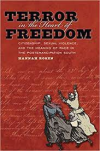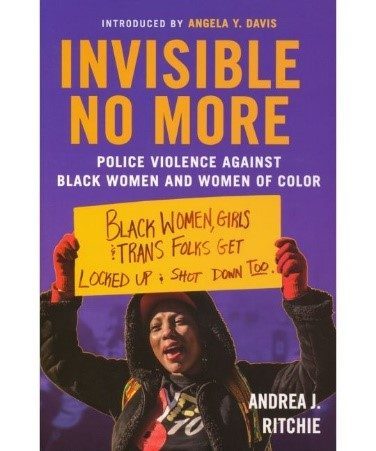How well do you know the history of Anti-Sexual Violence Movements?
15 resources that contextualize anti-sexual violence movements and uplift transformative strategies and narratives of healing and justice for Sexual Assault Awareness Month

- Terror in the Heart of Freedom, Citizenship, Sexual Violence and the meaning of race in the Post-emancipation South, By Hannah Rosen
- Linking political events at the city, state, and regional levels, Rosen places gender and sexual violence at the heart of understanding the reconsolidation of race and racism in the post-emancipation United States.
- One of few books that uplifts the life and resistance of Frances Thompson, survivor of the Memphis Riots of 1866 and the first Black Transgender Woman to testify before Congress

- Women, Race & Class by Angela Y. Davis
- A powerful study of the women’s movement in the U.S. from abolitionist days to the present (or 1983, when this edition was published), which demonstrates how it has always been hampered by the racist and classist biases of its leaders.
 At the Dark End of the Street: Black Women, Rape and Resistance – a New History of the Civil Rights Movement from Rosa Parks to the Rise of Black Power, by Danielle L. McGuire
At the Dark End of the Street: Black Women, Rape and Resistance – a New History of the Civil Rights Movement from Rosa Parks to the Rise of Black Power, by Danielle L. McGuire
- The author gives us the never-before-told history of how the civil rights movement began; how it was in part started in protest against the ritualistic rape of black women by white men who used economic intimidation, sexual violence, and terror to derail the freedom movement; and how those forces persisted unpunished throughout the Jim Crow era.
 Open Letter to the Anti-Rape Movement
Open Letter to the Anti-Rape Movement
- This zine includes an open letter written in 1977 by robin mc’duff, deanne pernell and karen saunders. The zine was conceived by Mariame Kaba and designed by Hope Dector.
 Color of Violence, The INCITE! Anthology edited by INCITE! Women of Color Against Violence
Color of Violence, The INCITE! Anthology edited by INCITE! Women of Color Against Violence
- The editors and contributors to Color of Violence ask: What would it take to end violence against women of color? Presenting the fierce and vital writing of organizers, lawyers, scholars, poets, and policy makers, Color of Violence radically repositions the antiviolence movement by putting women of color at its center. The contributors shift the focus from domestic violence and sexual assault and map innovative strategies of movement building and resistance used by women of color around the world.

- Invisible No More, Police Violence Against Black Women and Women of Color by Andrea J. Ritchie, Introduced by Angela Y. Davis“The insights revealed by these experiences, if heeded, will undoubtedly transform eh course of history” – Opal Tometi, cofounder of Black Lives Matter
 The Beginning and End of Rape, Confronting sexual violence in Native America, by Sarah Deer
The Beginning and End of Rape, Confronting sexual violence in Native America, by Sarah Deer
- How to address widespread violence against Native women—practically, theoretically, and legally—from the foremost advocate for understanding and change
 Care Work: Dreaming Disability Justice by Leah Lakshmi Piepzna-Samarashinha
Care Work: Dreaming Disability Justice by Leah Lakshmi Piepzna-Samarashinha
- Care Work is a mapping of access as radical love, a celebration of the work that sick and disabled queer/people of color are doing to find each other and to build power and community, and a tool kit for everyone who wants to build radically resilient, sustainable communities of liberation where no one is left behind. Powerful and passionate, Care Work is a crucial and necessary call to arms.
 Queering Sexual Violence: Radical Voices within the Anti-Violence Movement edited by Jennifer Patterson
Queering Sexual Violence: Radical Voices within the Anti-Violence Movement edited by Jennifer Patterson
- Often pushed to the margins, queer, transgender and gender non-conforming survivors have been organizing in anti-violence work since the birth of the movement. Queering Sexual Violence: Radical Voices from Within the Anti-Violence Movement locates them at the center of the anti-violence movement and creates a space for their voices to be heard. Moving beyond dominant narratives and the traditional “violence against women” framework, the book is multi-gendered, multi-racial and multi-layered
 Love with Accountability, Digging Up the Roots of Child Sexual Abuse, Edited by Aishah Shahidah Simmons, Forward by Darnell L. Moore
Love with Accountability, Digging Up the Roots of Child Sexual Abuse, Edited by Aishah Shahidah Simmons, Forward by Darnell L. Moore
- Love WITH Accountability features compelling writings by child sexual abuse survivors, advocates, and Simmons’s mother, who underscores the detrimental impact of parents/caregivers not believing their children when they disclose their sexual abuse. This collection explores disrupting the inhumane epidemic of child sexual abuse, humanely.
 Beyond Survival, Strategies and Stories from the Transformative Justice Movement, Ejeris Dixon and Leah Lakshmi Piepzna-Samarasinha
Beyond Survival, Strategies and Stories from the Transformative Justice Movement, Ejeris Dixon and Leah Lakshmi Piepzna-Samarasinha
- Transformative justice seeks to solve the problem of violence at the grassroots level, without relying on punishment, incarceration, or policing. Community-based approaches to preventing crime and repairing its damage have existed for centuries. However, in the putative atmosphere of contemporary criminal justice systems, they are often marginalized and operate under the radar. Beyond Survival puts these strategies front and center as real alternatives to today’s failed models of confinement and “correction.”
 Building Accountable Communities: A Video Series
Building Accountable Communities: A Video Series
- Created with Project NIA, these videos are part of the Building Accountable Communities Project, promoting non-punitive responses to harm by developing resources for transformative justice practitioners and organizing convenings and workshops that educate the public.
 Fumbling Towards Repair, A workbook for Community Accountability Facilitators, by Mariame Daba, Shira Hassan
Fumbling Towards Repair, A workbook for Community Accountability Facilitators, by Mariame Daba, Shira Hassan
- Fumbling Toward Repair is a workbook by Mariame Kaba and Shira Hassan that includes reflection questions, skill assessments, facilitation tips, helpful definitions, activities, and hard-learned lessons intended to support people who have taken on the coordination and facilitation of formal community accountability processes to address interpersonal harm & violence.
 I Hope We Choose Love, A Trans Girl’s Notes from the End of the World by Kai Cheng Thom
I Hope We Choose Love, A Trans Girl’s Notes from the End of the World by Kai Cheng Thom
- What can we hope for at the end of the world? What can we trust in when community has broken our hearts? What would it mean to pursue justice without violence? How can we love in the absence of faith?
 Pleasure Activism, The Politics of Feeling Good by adrienne maree brown
Pleasure Activism, The Politics of Feeling Good by adrienne maree brown
- Drawing on the Black feminist tradition, she challenges us to rethink the ground rules of activism. Her mindset-altering essays are interwoven with conversations and insights from other feminist thinkers, including Audre Lorde, Joan Morgan, Cara Page, Sonya Renee Taylor, and Alexis Pauline Gumbs. Together they cover a wide array of subjects—from sex work to climate change, from race and gender to sex and drugs—building new narratives about how politics can feel good and how what feels good always has a complex politics of its own.
